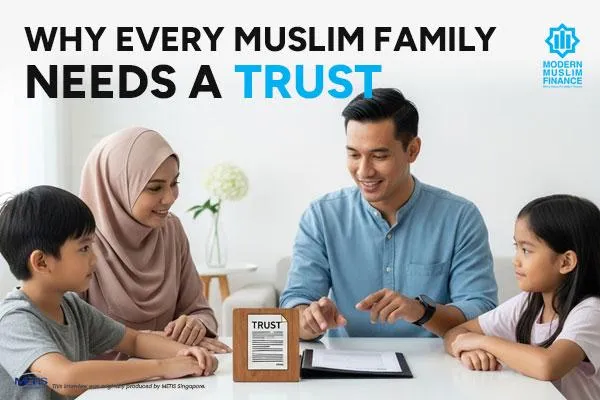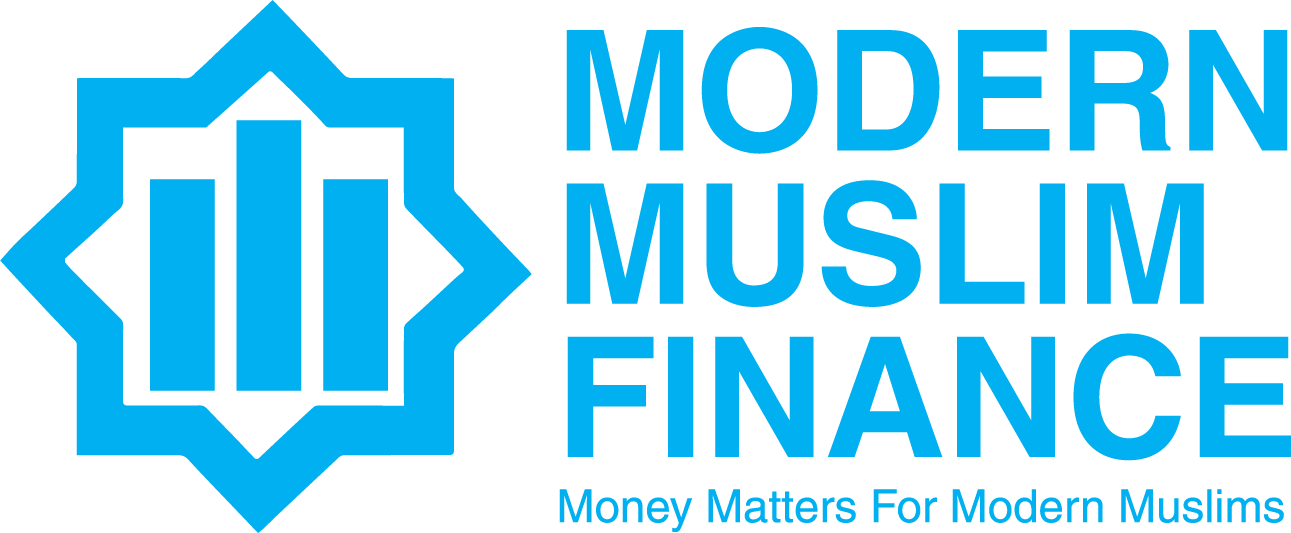Blog

Islamic Estate Planning in Singapore: Why a Shariah-Compliant Trust is Essential (Beyond Just a Wasiat)
Our very own Chief Finance Ninja, Mr. Syed Afiq, recently sat down for an exclusive interview with METIS Singapore. The focus was on a topic critical for every Muslim family in Singapore: the essential role of a Trust in a comprehensive Islamic estate plan.
For too long, the concept of a Trust has been shrouded in misconception. However, as Mr. Afiq explains, a well-structured Shariah-compliant Trust doesn't go against Faraid—it complements and protects your family's inheritance.
We’ve distilled the key insights from the interview into this essential guide.
Watch the Exclusive Interview
Before diving into the details, you can watch the full interview here:
Why Every Muslim Family Needs a Trust (Not Just a Wasiat) | Exclusive Interview with Syed Afiq
Expert Q&A: The Role of a Trust in Your Islamic Estate Plan
1. From your perspective, why is a Wasiat alone not sufficient for estate planning?
A common misconception in Singapore is that because Faraid exists, no estate planning is necessary. This is absolutely wrong. In the Singapore context, a Wasiat (Islamic Will) is primarily an administrative document. Its primary function is to inform the courts who the administrator is when you pass away.
Crucially, your Wasiat generally does not cover key assets like your CPF or insurance policies.
According to Mr. Afiq, a comprehensive plan requires thinking about what you have, who you want to give it to, when, and how. A Wasiat, by itself, simply doesn't provide this level of control and planning complexity.
2. Could you briefly explain what a Trust is and how it works in the context of Islamic estate planning?
In simple terms, a Trust is a separate legal entity that owns your assets for you—you no longer own them. You can visualize it as a protective box where you put your assets.
You then assign a Trustee (an individual or a company) whom you trust to manage these assets according to your wishes. This allows you to set specific instructions, such as:
Providing regular income for your children.
Setting aside funds for future debts.
Even allocating income for your own care if you become incapacitated.
The key benefit in Islamic estate planning is that a Trust segregates your assets to the side, protecting them from the potentially very long probate process.
3. Can a Trust be structured in a Shariah-compliant manner while still respecting Faraid principles?
Absolutely. This is the biggest misconception about Trusts and Wasiat—that they go against Faraid.
To structure a Shariah-compliant Trust, you must speak to a qualified professional. In the Letter of Wishes or the Trust Deed, you can explicitly instruct the Trustee to distribute the assets according to Faraid.
For example, you can stipulate that your wife receives her prescribed 1/8 share, and your children receive their specific shares. Mr. Afiq emphasises that a Trust can and should complement Faraid, not go against it, by aligning it with your values and principles as a Muslim.
4. In what kinds of situations would a Trust be especially beneficial for a Muslim family?
A Trust offers bespoke solutions for complex family structures and specific circumstances.
Young Children
If you pass away, children's shares go to their appointed guardians. A Trust allows you to instruct the Trustee to manage the money well and distribute it in a measured way (e.g., monthly payments or a lump sum at a certain age).
Children with Special Needs
These children may be unable to manage a large inheritance. A Trust appoints a Trustee to administer the funds in a specific, measured way for the child’s lifelong betterment.
Business Owners
For complex entities like Private Limited companies or LLCs, a Trust allows you to put your business assets inside and instruct your Trustee to ensure business continuity even when you are gone.
Blended Families
Faraid only applies to biological children, excluding stepchildren. A Trust can be set up with specific instructions to ensure equitable distribution and benefit all children—your biological, your spouse's, and those you had together—according to your wishes.
5. Islam emphasises clearing debts before distribution. How can a Trust help ensure this is fulfilled?
Islam is very specific that all debts must be paid off first before beneficiaries receive their inheritance.
While Trust assets are legally protected from creditors and the probate process, this does not mean you cannot nominate assets (like CPF or insurance) into the Trust and instruct the Trustee to pay off outstanding debts upon your passing. This portion is then used to clear your debts, and the remainder is distributed via Faraid.
As Mr. Afiq reminds us, the Prophet Muhammad (PBUH) was sensitive to this matter, and ensuring your debts are cleared is essential for your status in the Hereafter.
6. What are some common misconceptions Muslims have about Trusts? And how would you address those concerns?
Mr. Afiq highlights two primary misconceptions:
"Trusts are only for the rich people."
This was true 20 years ago, but in today's modern context, Trusts are easily accessible and low-cost solutions. You can start funding your Trust with as little as a few hundred dollars a month.
"Trusts are used to cheat Faraid."
This is the wrong intention. While one could structure a Trust to go against Faraid, the purpose of a Shariah-compliant Trust is the opposite: to align the Trust Deed with Faraid and respect Islamic rules and regulations.
7. You mentioned that Trusts complement Faraid and Wasiat, not replace them. How do these elements work together in a comprehensive estate plan?
These three elements form a complete, cohesive plan:
Faraid: This is the foundational set of rules that dictates who gets what share from your estate. This is the instruction you give the Trust to follow.
Wasiat (Islamic Will): This appoints the trustworthy Executive (administrator) to follow your wishes. Importantly, the Wasiat also enables you to give away up to 33% (one-third) of your estate outside of Faraid for things like charitable giving or creating a Waqaf.
Trust: This is the administrative vessel that holds your segregated assets. It receives a specific instruction on how to distribute based on the rules of Faraid and the non-Faraid allocations detailed in your Wasiat.
8. Could you share a case or scenario where a Trust made a significant difference in protecting a family's assets or intentions?
Mr. Afiq shared a scenario involving a couple with sizable assets and young children. Their biggest concern was that if they passed away, their assets would go to their children’s appointed guardians—a situation where things could go wrong, even with trusted individuals.
By setting up a Trust, they achieved comprehensive protection:
They nominated their CPF and insurance and funded the Trust with assets.
They established a Letter of Wishes to ensure the children received their inheritance in a specific way.
The overall arrangement gave the family peace of mind and protected the children from any misdeeds or unforeseen circumstances.
It also empowered the guardian by providing an allowance and instructing the Trustee to invest the money in a Shariah-compliant portfolio for the long-term growth and future needs (like university expenses) of the children. The Trust then paid out the lump sum when the children were deemed mature (e.g., 28-30 years old).
9. For those watching who are considering writing a Wasiat or reviewing their estate plan - why should they consider enhancing it with a Trust?
If you already have a Wasiat, or are planning one, a Trust is the next step to enhance your overall planning process.
The single biggest benefit of a Trust is that by segregating your assets away from your estate, it bypasses probate. Without a Trust, going to court with a Wasiat can take months, or even years, if the case is complicated. Having a Trust makes the entire inheritance process faster and smoother for your loved ones.
10. Which one comes first: a Wasiat or a Trust?
Both the Wasiat and the Trust are living documents that must be written and created while you are still alive.
Therefore, you can and should do both at the same time. The key is to have a comprehensive sit-down session with a qualified professional to plan your desired outcomes and implement both the Wasiat and the Trust simultaneously for a complete Islamic estate plan.
Your Next Step in Islamic Estate Planning
Estate planning is not something to postpone until it is too late. The synergy between Faraid, a well-drafted Wasiat, and a customized Shariah-compliant Trust provides the ultimate safeguard for your family's future, ensuring your wishes are followed and your inheritance is distributed Islamically and smoothly.
Mr. Afiq and the Modern Muslim Finance team have helped over 500 Muslim families with their estate planning. If you need help to understand your challenges and propose the correct solutions, we are here to help.
Reach out to us for a consult to plan your estate Islamically and smoothly.
Contact Us:
WhatsApp: +6589528511
Email: [email protected]
Address:
114 Lavender Street, #07-83 CT Hub 2,
Singapore 338729
Email:
[email protected]
WhatsApp:
+65 8952 8511
Website:
modernmuslim.finance








